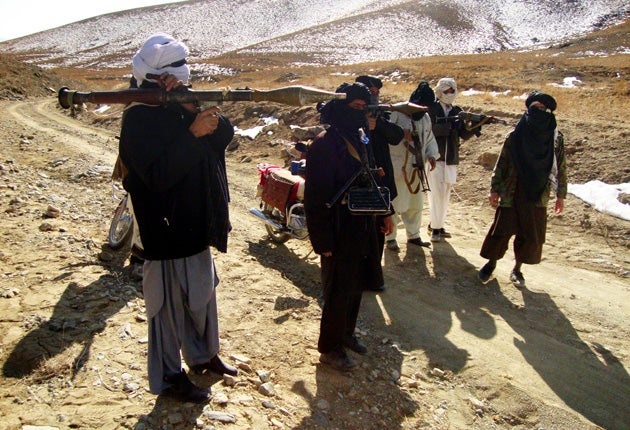Pakistan spies have 'seat on Taliban council'

Your support helps us to tell the story
From reproductive rights to climate change to Big Tech, The Independent is on the ground when the story is developing. Whether it's investigating the financials of Elon Musk's pro-Trump PAC or producing our latest documentary, 'The A Word', which shines a light on the American women fighting for reproductive rights, we know how important it is to parse out the facts from the messaging.
At such a critical moment in US history, we need reporters on the ground. Your donation allows us to keep sending journalists to speak to both sides of the story.
The Independent is trusted by Americans across the entire political spectrum. And unlike many other quality news outlets, we choose not to lock Americans out of our reporting and analysis with paywalls. We believe quality journalism should be available to everyone, paid for by those who can afford it.
Your support makes all the difference.Pakistan's notorious spy agency provides crucial funding and training to Taliban fighters operating inside Afghanistan and is represented on the movement's leadership council, according to a new report that says links between the two are deeper than previously believed.
Such is the importance of the relationship, says the report, that President Asif Ali Zardari recently visited Taliban prisoners, assuring them they would soon be released and telling them: "You are our people."
While links between the Inter Services Intelligence (ISI) agency and the Taliban have been known for many years, the report by the London School of Economics, based on interviews with Taliban commanders inside Afghanistan, suggests it is the "official policy" of Pakistan, which sees the fighters as providing strategic depth.
"The ISI orchestrates, sustains and strongly influences the movement," said its author, Matt Waldman. "[Taliban commanders] say it gives sanctuary to both Taliban and Haqqani [their allies in north Waziristan] and provides huge support in terms of training, funding, munitions, and supplies. In their words, this is 'as clear as the sun in the sky'."
The ISI developed relationships with various militant groups, among them the Taliban, whose fighters received funding and training from Islamabad enabling them to sweep to power in Afghanistan in the mid 1990s. Just last year, Mr Zardari said the ISI and the CIA "created them together".
The US, India and Afghanistan have accused the ISI of continuing those links. In the summer of 2008, the CIA even accused elements within the ISI of helping Taliban-linked fighters to bomb the Indian Embassy in Kabul.
But the report by Mr Waldman suggests an ongoing relationship, approved by the highest levels of the military and political establishment. It is so important that the ISI is officially represented on the Afghan Taliban's 15-member leadership council, the Quetta Shura, which is believed to meet in the west and south of Pakistan.
It also claims that Mr Zardari travelled with an ISI official in March to a secret jail where 50 Taliban prisoners were held. He reportedly told them they had only been arrested because of US pressure and said: "After your release we will, of course, support you to do your operations."
Mr Waldman said: "I was surprised by the [depth of the relationship]. I kept hearing it from people who were in no way connected with each other."
Since the aftermath of 11 September, when the US demanded Pakistan end its support for the Taliban, Islamabad has received billions of dollars in military aid to confront militants. Yet Pakistan's military has sought to draw a distinction between militants responsible for attacks on targets inside the country, and those who mainly strike at US and Western troops in Afghanistan. It is a policy that causes deep consternation in the West.
Mr Waldman said that if what Taliban commanders had told him was true, Pakistan was pursuing a dangerous strategic game. He said he believed Islamabad remained genuinely anguished by the threat presented by India and that the Taliban were considered a counterweight to this. "It's important that we appreciate the depth of that concern," he said.
Officials in Islamabad have dismissed Mr Waldman's report. Senator Farhatullah Babar, a spokesman for Mr Zardari, said that while the government believed in dialogue with militants who had given up violence, "there was no question of the president having met with Taliban prisoners". He added: "The president, the government and the Pakistan People's Party has always maintained the Taliban is seeking to impose its agenda on the people of Pakistan through violence."
Join our commenting forum
Join thought-provoking conversations, follow other Independent readers and see their replies
Comments